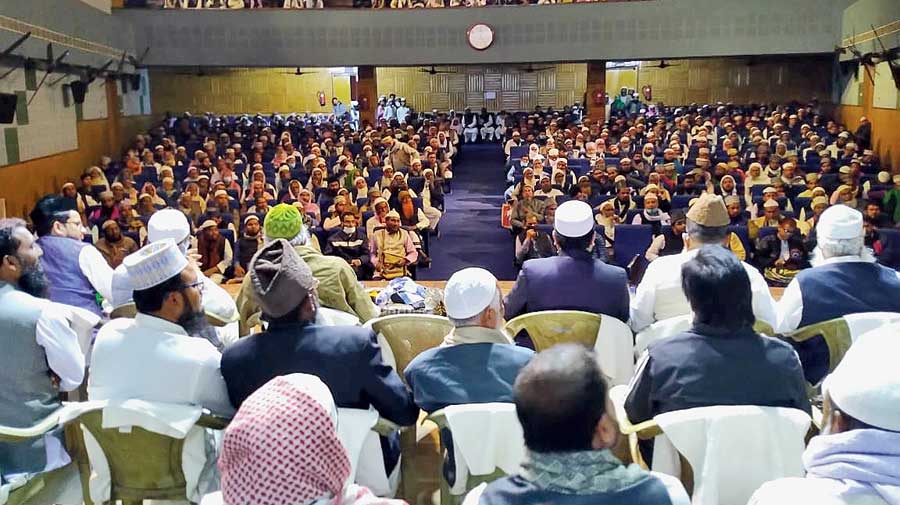The Murshidabad unit of the All India Imam-Muezzin and Social Welfare Organisation on Sunday held a general meeting here and emphasised the need to elect a “secular and competent” party in Bengal in order to do away with “divisive forces in the country”.
The meeting that was touted to guide the community in favour the Trinamul Congress was attended by 650 representatives, including state library services minister Siddiqullah Chowdhury, Maulana Qari Fazlur Rahman, Maulana Shafeeq Qasmi and former Trinamul Congress Rajya Sabha member Ahmed Hassan Imran.
Although the All India Majlis-e-Ittehadul Muslimeen led by Asaduddin Owaisi or Furfura Sharif cleric Abbasuddin Siddiqui were not named, the exercise was largely to mitigate their influence as they attempt putting together a minority alliance for Bengal, which is likely to help the BJP by cutting into Muslim electoral support for the Trinamul Congress.
“Can the CPM or the Congress form a government? No,” said minister Siddiqullah Chowdhury, adding that the responsibility of “acting as community leaders to stem divisive forces” fell on imams at their respective villages.
“The need of the hour is such that religious leaders need to guide their electorate to the right choice, but it needs to be done tactfully,” he added.
Youth leader Oyazul Haque from the Bangiya Sankhalagu Buddhijibi Manch went a step further, saying even “Masjid mic systems could be used to spread the word ahead of the Assembly elections”.
The meeting held at Behrampore Rabindra Sadan acted as a shot in the arm for Trinamul’s image leading up to the polls, in the wake of significant challenges it has faced in the last few months in the form of BJP road shows in districts as well as the defection of its leaders.
“As Muslims, we do not have any opportunity to be divided amongst ourselves. This year is too significant for that. Or else, we, too, will be beaten like our brothers in Uttar and Madhya Pradesh and our mosques, too, will be stormed,” said Imran.
“Communal forces need to be struck down strongly, and that will only happen if we unite behind the secular force,” added Maulana Qazmi, the imam of Calcutta’s Nakhoda Masjid.
The unilateral meeting held ostensibly in favour of the current ruling party capped an incremental trend for the state’s minority voters, who until 2006 — as reported by the Sachar Committee — were notably unconsolidated in their voting patterns under the CPM rule.
In 2006, minority MLAs numbered 43 in the Assembly, whereas the number rose to 57 in Trinamul’s first term, long before they were attacked by opponents for allegedly playing to the minority
“vote bank”. The number of minority MLAs rose to 59 in Trinamul’s current term at government, of which 32 were from their own party.
According to the 2011 census, Muslims constitute about a third of the state’s electorate. In districts such as Murshidabad, Malda and North Dinajpur, the minority community holds the decisive sway over electoral outcomes.
The districts of Birbhum, South 24-Parganas and Nadia also pose significant numbers as of the last count, with minority voter percentages being pegged at approximately 37, 35 and 26 per cent, respectively.
Approximately 90-100 Assembly seats, out of the state’s 294 have significant minority electors, and 63 comprise more than 30 per cent minority electors.











